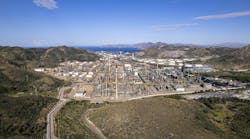Eric Watkins
Senior Correspondent
LOS ANGELES, Sept. 18 -- Russia should restrict the amount of oil it plans to transport to China via the projected Eastern Siberia Pacific Ocean pipeline, leaving more available to be refined and exported as products to other markets, according to OAO Rosneft Deputy President Dmitry Bogdanchikov.
"We believe that oil exports to China can be restricted by rail transport and oil deliveries to oil refineries of the [Russian] Far East and other regions should be increased after the Eastern Siberia-Pacific Ocean pipeline is launched," Bogdanchikov told state media.
His remarks suggest a reversal in existing plans for the pipeline which have called for a two-stage construction, with the first stage to include a spur from the main line capable of carrying 15 million tonnes/year of oil to China.
Instead, Bogdanchikov said refineries in Russia's Far East should be the priority destination for oil to be transported along the ESPO line, with the further aim of exporting refined products to overseas markets.
He said it would "make sense" and be "more lucrative" for Russia to refine the oil that is to be transported along the ESPO line instead of exporting it as crude.
Bogdanov said the Rosneft's Komsomolsk refinery, in Komsomolsk-on-Amur in the Khabarovsk territory, and a planned refinery on Russia's Pacific coast should be the main recipients of the crude oil that is to be transported along the ESPO.
He said the firm has alerted the Russian government to the idea, and is now awaiting its decision.
Meanwhile, the first stage of the refinery at the ESPO's terminus will be built by 2012, according to Rosneft Vice-Pres. Alexander Sapronov.
He said the feasibility study of the Eastern refinery project will begin soon and that plans call for the refinery's construction in two stages with a capacity of 10 million tonnes each.
Contact Eric Watkins at [email protected].

